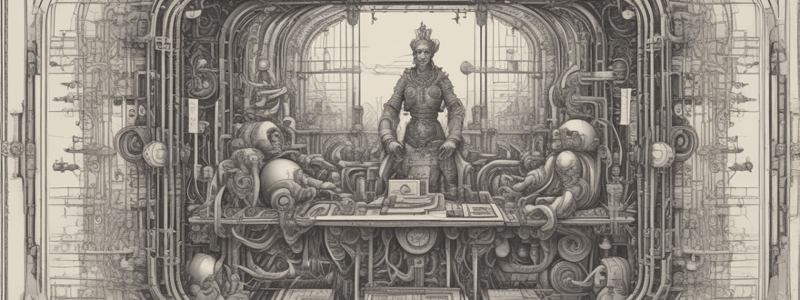Podcast
Questions and Answers
What is the primary goal of complexity theory?
What is the primary goal of complexity theory?
- To analyze the efficiency of algorithms
- To define mathematical models of computation
- To determine the solvability of problems
- To classify problems as easy or hard (correct)
Which model is commonly used in text processing and hardware design?
Which model is commonly used in text processing and hardware design?
- Context-free grammar
- Finite automaton (correct)
- Turing machine
- Pushdown automaton
What does computability theory primarily focus on?
What does computability theory primarily focus on?
- The efficiency of algorithms
- Defining the structure of programming languages
- The solvability of problems (correct)
- Classifying computational models
In which area is context-free grammar predominantly applied?
In which area is context-free grammar predominantly applied?
How does automata theory contribute to the understanding of computation?
How does automata theory contribute to the understanding of computation?
In complexity theory, problems are classified as easy ones and ______ ones.
In complexity theory, problems are classified as easy ones and ______ ones.
Computability theory classifies problems by those that are ______ and those that are not.
Computability theory classifies problems by those that are ______ and those that are not.
The finite automaton is one model used in text processing, compilers, and ______ design.
The finite automaton is one model used in text processing, compilers, and ______ design.
Another model used in programming languages and artificial intelligence is called the ______-free grammar.
Another model used in programming languages and artificial intelligence is called the ______-free grammar.
Automata theory introduces concepts relevant to other non-theoretical areas of computer ______.
Automata theory introduces concepts relevant to other non-theoretical areas of computer ______.
Flashcards are hidden until you start studying
Study Notes
Introduction to Theory of Computation
- Focuses on three key areas: automata, computability, and complexity.
- Central question explored: What are the fundamental capabilities and limitations of computers?
- Historical roots trace back to the 1930s with early mathematical logicians' inquiries into computation.
Complexity Theory
- Problems vary in difficulty; examples include:
- Sorting problem: Simple and solvable in a short time, even for large datasets.
- Scheduling problem: Complex, potentially requiring centuries for optimal solutions at scale.
- Research has advanced understanding of what makes problems hard vs. easy, establishing a classification scheme for computational difficulty.
- Complexity theory impacts various fields, with cryptography being a unique domain that requires hard computational problems to maintain security.
Computability Theory
- Mathematicians like Kurt Gödel, Alan Turing, and Alonzo Church identified problems unsolvable by computers.
- A classic example is the determination of the truth of mathematical statements, illustrating inherent limitations of computing.
- Distinction between solvable and unsolvable problems, contrasting with complexity theory's focus on easy vs. hard problems.
Automata Theory
- Deals with mathematical models of computation and their properties.
- Important models include:
- Finite automaton: Utilized in text processing, compiler design, and hardware formulation.
- Context-free grammar: Integral in programming language development and artificial intelligence.
- Serves as an introductory framework for the study of computation theory, facilitating the understanding of core concepts in computability and complexity.
Introduction to Theory of Computation
- Focuses on three key areas: automata, computability, and complexity.
- Central question explored: What are the fundamental capabilities and limitations of computers?
- Historical roots trace back to the 1930s with early mathematical logicians' inquiries into computation.
Complexity Theory
- Problems vary in difficulty; examples include:
- Sorting problem: Simple and solvable in a short time, even for large datasets.
- Scheduling problem: Complex, potentially requiring centuries for optimal solutions at scale.
- Research has advanced understanding of what makes problems hard vs. easy, establishing a classification scheme for computational difficulty.
- Complexity theory impacts various fields, with cryptography being a unique domain that requires hard computational problems to maintain security.
Computability Theory
- Mathematicians like Kurt Gödel, Alan Turing, and Alonzo Church identified problems unsolvable by computers.
- A classic example is the determination of the truth of mathematical statements, illustrating inherent limitations of computing.
- Distinction between solvable and unsolvable problems, contrasting with complexity theory's focus on easy vs. hard problems.
Automata Theory
- Deals with mathematical models of computation and their properties.
- Important models include:
- Finite automaton: Utilized in text processing, compiler design, and hardware formulation.
- Context-free grammar: Integral in programming language development and artificial intelligence.
- Serves as an introductory framework for the study of computation theory, facilitating the understanding of core concepts in computability and complexity.
Studying That Suits You
Use AI to generate personalized quizzes and flashcards to suit your learning preferences.




